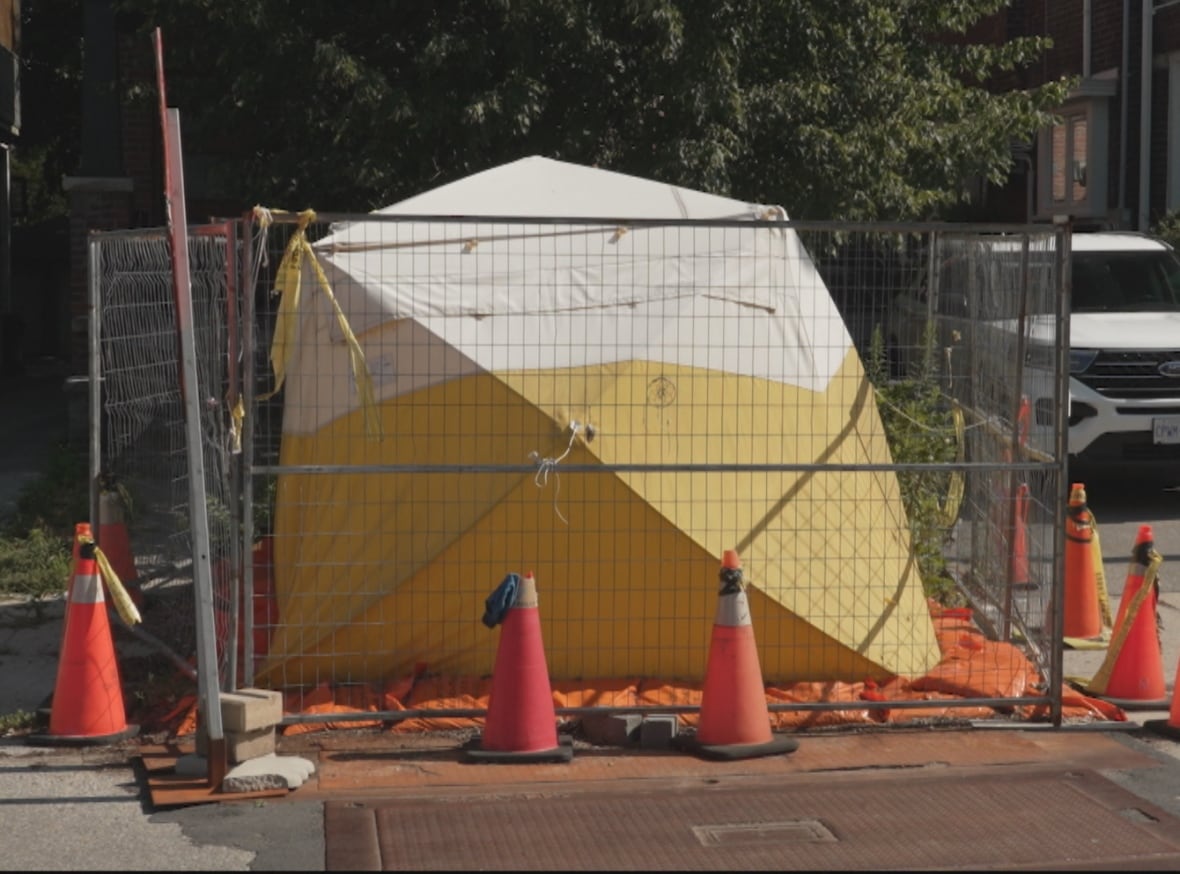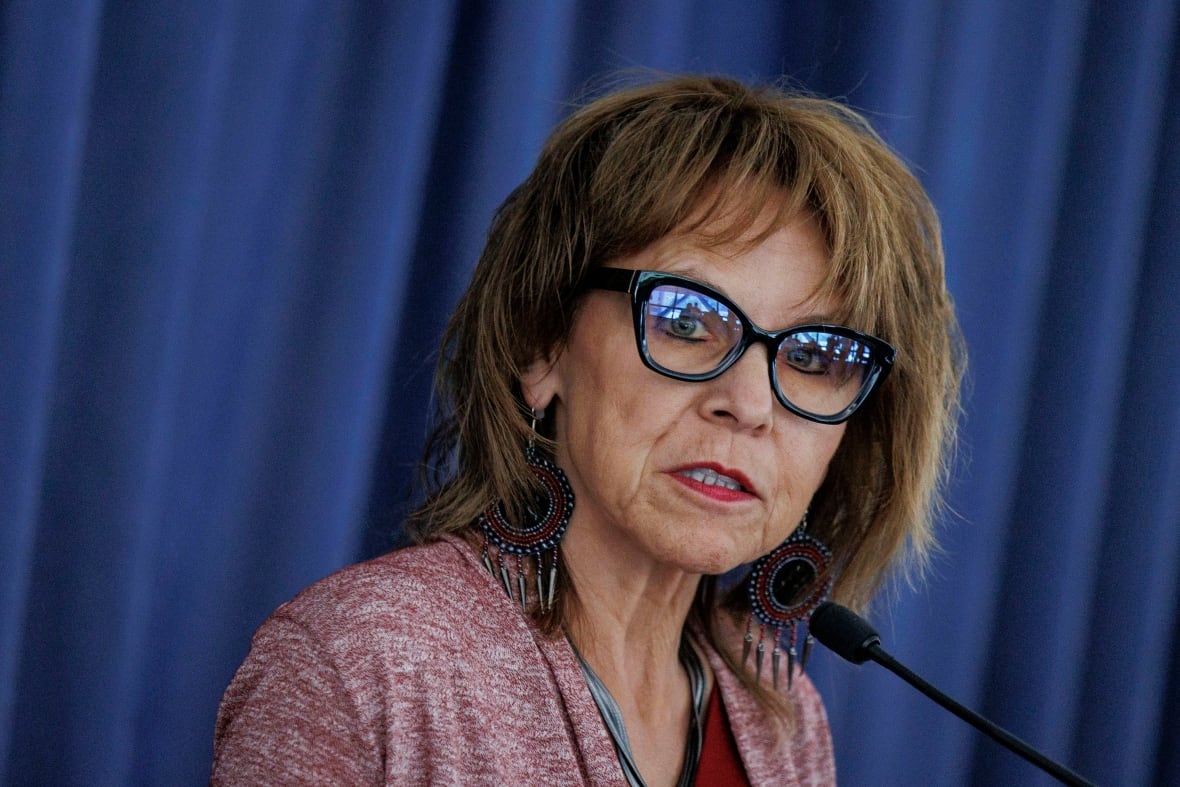City seeks to resolve dispute about likely ancient Indigenous remains found in Toronto
Contractor working on water service line on Withrow Avenue discovered bones in January 2024
City staff are hoping to resolve a dispute over what are believed to be ancient Indigenous human remains found below a Toronto sidewalk.
The remains were found on Jan. 5, 2024 on Withrow Avenue in Riverdale by a city contractor working on a water service line. The area has been known to be an archeological site since at least 1886, when it's reported that crews excavating the initial construction of Withrow Avenue found communal gravesites in the area.
Will Johnston, deputy city manager for infrastructure services, said on Monday 10 out of 11 Indigenous groups consulted since then are on board with a plan on how to handle the remains and have agreed to help monitor the burial site process or to provide consent for it to proceed.
Earlier this month on July 17, the Haudenosaunee Development Institute (HDI), which represents the interests of Haudenosaunee Confederacy Chiefs Council, threatened in a news release to shut down the construction activity at the site. The HDI says it has been denied access to the remains.
Johnston told reporters at a news conference that the city is committed to having all 11 groups involved.
"We recognize the need to conduct this process with the utmost sensitivity and respect and with meaningful communication and engagement with Indigenous and First Nations as a top priority," Johnston said.
"After 19 months since this discovery, we need to resolve this matter. The ancestors deserve this."
When the remains were found, work immediately stopped and the city contacted Toronto police, who took control of the site, Johnston and Lou Di Gironimo, general manager of Toronto Water, said.
Police contacted the coroner's office. That office retained an anthropologist, who determined that the remains were human, ancient and likely of Indigenous origin.
The provincial registrar for the funeral, burial and cremation services directed the city to protect the site and to investigate. The soil removed from the ground was put in a safe place, according to Di Gironimo.

As part of the order, the registrar contacted 11 Indigenous groups to notify them about the remains and invite them to provide advice on protecting the site. Di Gironimo said the city has worked with the First Nations to ensure Indigenous protocols are followed.
City staff also hired a licensed archeological consultant to determine the origin of the site, he said. The city has since retained a second licenced archaeological consultant, Archaeological Services Inc. (ASI). Once the investigation is completed, a report will be submitted to the city and registrar by this fall.
"All 11 parties are welcome, and have always been welcome, to join the monitoring process associated with Withrow," Di Gironimo said.
Haudenosaunee objects to process
The HDI claims the remains are of the Haudenosaunee people. It said in its news release that it has been denied basic information and has been told in writing that the remains are sitting in a dump truck.
"The Haudenosaunee Development Institute (HDI) is prepared to shut down all construction activity on Withrow Avenue following revelations that the ancestral remains of the Haudenosaunee people have been kept in a dump truck for over a year after being extracted from an active archaeological site.
"The current location of this dump truck, and those remains, is unknown," the HDI says in the release.
Aaron Detlor, legal counsel for HDI, said the Haudenosaunee wants to do its own investigation.
According to city staff, the HDI made unrealistic demands that could not be met. The city did not elaborate on what those demands were.
At the news conference, city staff said the remains were secured in a truck, adding that the soil was not put back into the site because they did not want to disturb it further.
Mississaugas of the Credit First Nation disputes claims
At Monday's news conference, Claire Sault, chief of the Mississaugas of the Credit First Nation (MCFN), said she disputes the HDI's claims.
The dispute has left the First Nation with a "feeling of unrest," she added.
"The Mississaugas of the Credit should be the only point of first contact until remains are determined by experts. Then, through proper protocol, if the remains are found to be from another tribe... We'll reach out to that tribe, nation to nation," she said.
The traditional territory of the Mississaugas of the Credit First Nation includes the city of Toronto and the First Nation is the sole treaty holder in Toronto, she said.
"We have a duty to speak out for these lands, to speak out for our ancestors and to speak out for our treaties," she said.
"And so let me be clear and let me be blunt. The group of individuals calling themselves HDI, the Haudenosaunee Development Institute, have no rights here. These are not their lands, They have no treaty here and they have no ancestral connection here."
Sault alleged the group has been "obstructing the important work that MCFN and the City of Toronto have been doing to respectfully and in a culturally appropriate way address this discovery of ancestral remains at the Withrow's burial site. This is unacceptable."

Lisa Merritt, principal of infrastructure at ASI, said the company will proceed carefully. She said it doesn't know how many people were buried there.
"We will begin very carefully to excavate any areas of lawn or soft scaping by hand, which will be done in one metre square units and following a grid pattern," Merritt said.
Toronto sits on the traditional territory of many nations, including the Mississaugas of the Credit, the Anishnabeg, the Chippewa, the Haudenosaunee and the Wendat peoples.
With files from Lane Harrison and The Canadian Press
